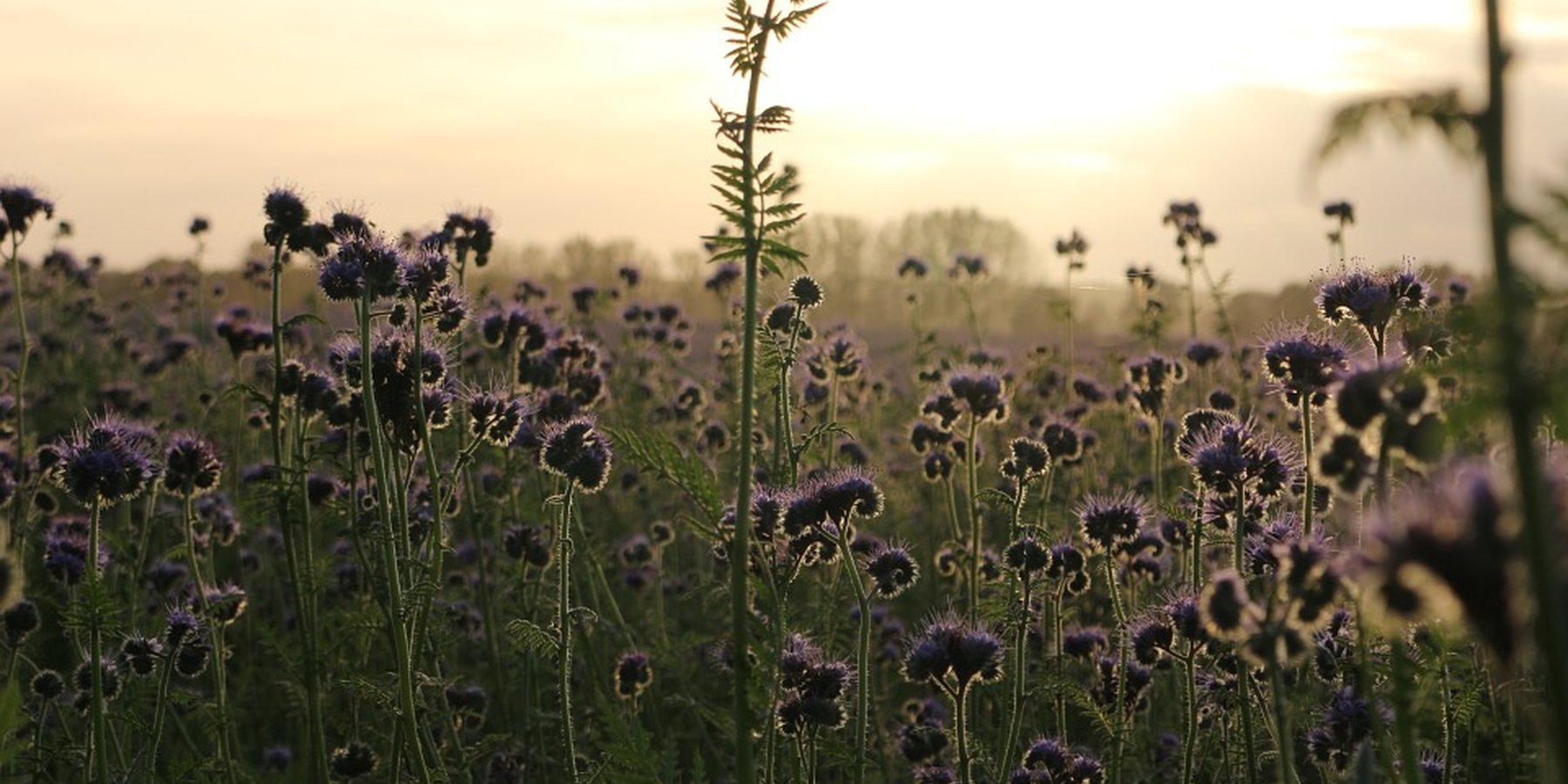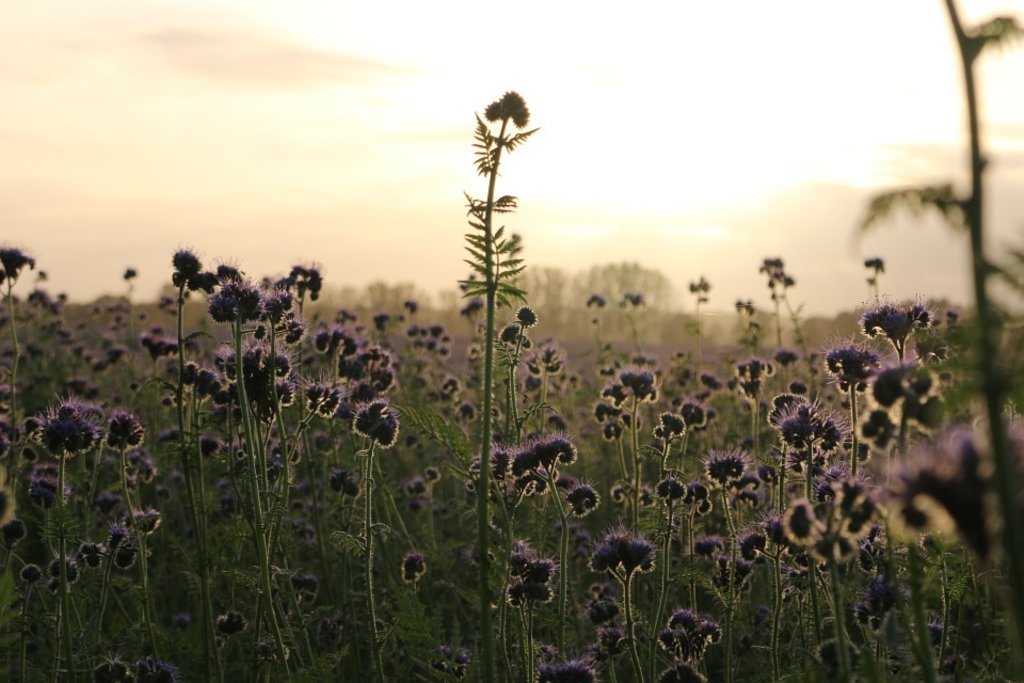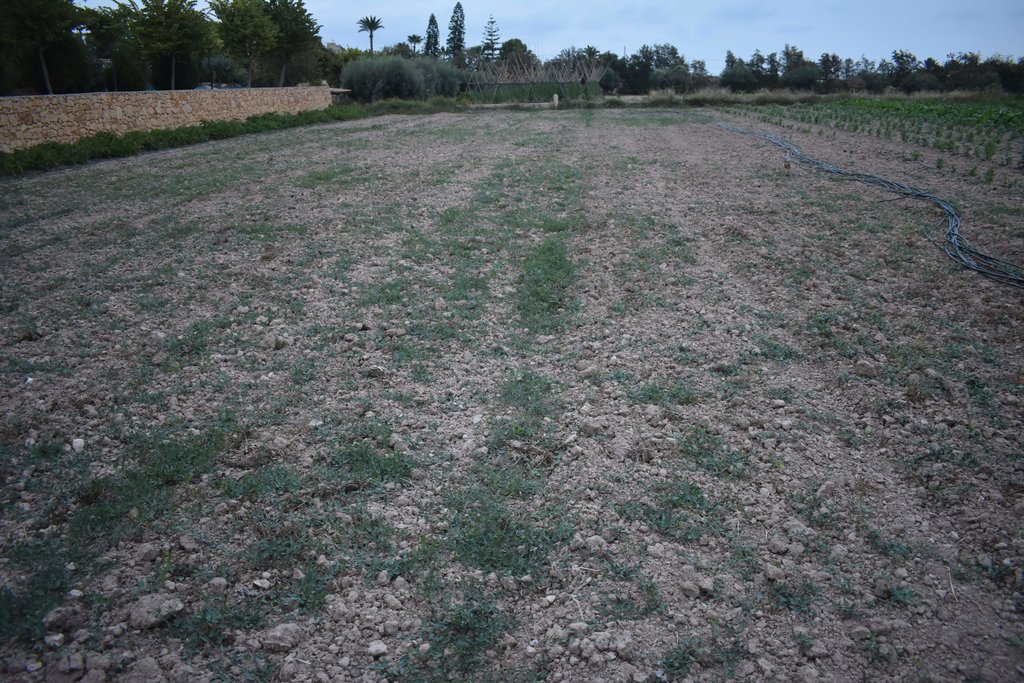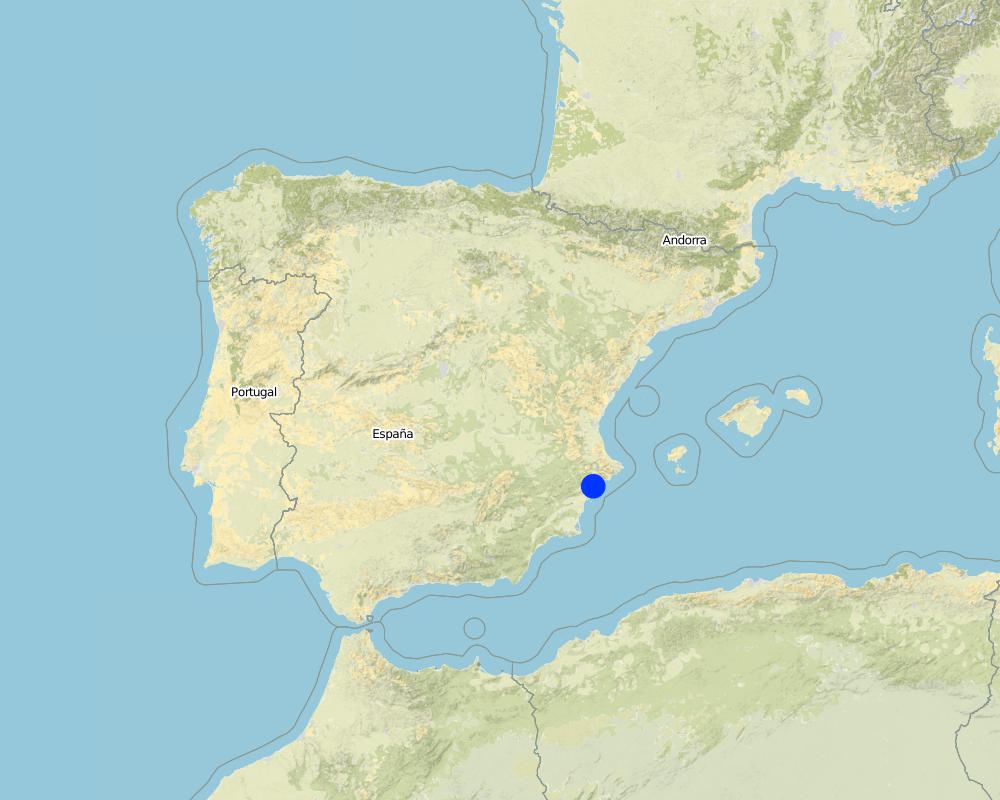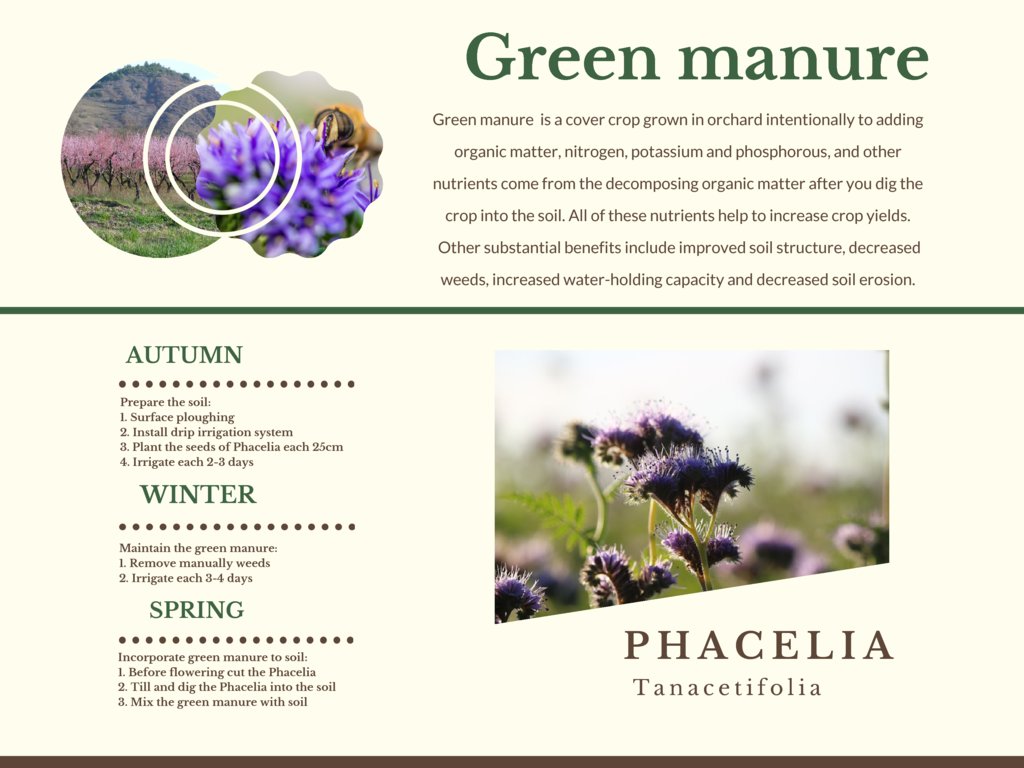Annual green manure with Phacelia tanacetifolia in southern Spain [西班牙]
- 创建:
- 更新:
- 编制者: Alicia Morugán-Coronado
- 编辑者: –
- 审查者: Ursula Gaemperli, Alexandra Gavilano
Abono verde con Facelia
technologies_3219 - 西班牙
查看章节
全部展开 全部收起1. 一般信息
1.2 参与该技术评估和文件编制的资源人员和机构的联系方式
有助于对技术进行记录/评估的项目名称(如相关)
Interactive Soil Quality assessment in Europe and China for Agricultural productivity and Environmental Resilience (EU-iSQAPER)有助于对技术进行记录/评估的机构名称(如相关)
Agrochesmistry and Environment Department, University Miguel Hernandez (UMH) - 西班牙1.3 关于使用通过WOCAT记录的数据的条件
编制者和关键资源人员接受有关使用通过WOCAT记录数据的条件。:
是
1.4 所述技术的可持续性声明
这里所描述的技术在土地退化方面是否存在问题,导致无法被认为是一种可持续的土地管理技术?:
否
2. SLM技术的说明
2.1 技术简介
技术定义:
Application of annual green manure with Phacelia Tanacetifolia sp. to improve soil quality and productivity on agricultural land.
2.2 技术的详细说明
说明:
1. This sustainable land management technology was established on agricultural land in Mutxamel (region of Alicante) in the municipality of Valencia (Comunidad Valenciana), Spain. Agricultural production in this region is of a very high quality and is intensely competitive. Despite this, the region’s traditional agriculture industry is nonetheless being overtaken by other sectors, with the scarcity of water emerging as a key factor in this shift. The main orchards in this region are: citrus, lemon, almonds and olives trees, other common crops are vegetables, such as tomatoes, lettuce, etc.
2. The SLM technology focuses on annual cultivation of green manure in the form of the plant of Phacelia tanacetifolia. Phacelia tanacetifolia (Hydrophyllaceae) is commonly known as Lacy or Tancy Phacelia (syn. Purple Tancy, Fiddleneck and Valley Velvenia). Native to Californian drylands, chaparral and Central oak woodland, P. tanacetifolia has been naturalised throughout the western United States and frequently in Europe, whereas it has been extensively used as a nectar crop up and as annual green manure worldwide. Phacelia is listed as one of the top 20 honey-producing flowers for honeybees and is very rich in both nectar and pollen the lavender-coloured flowers attract bees, butterflies and other pollinating insects.
3. Initially, the main objective of the land user applying the technology was to improve the soil quality and the crop production in the vegetable fields (cabbages, tomatoes, lettuce, chards, spinach) by cultivating the Phacelia plant as an annual green manure. In other words, the maintenance of a specific cover crop such as Phacelia tanacetifolia grown in the orchard is intended to add organic matter, nitrogen, potassium and phosphorous and other nutrients coming from the decomposed manuring plant after it is worked into the soil.
4. The land user prepares the soil during September or October by ploughing the surface of soil and then sowing the Phacelia tanacetifolia seed thinly at a rate of 1 gram per square meter and within 25 cm per plant. In the examined case, the land user installed a drip irrigation system to irrigate every two to three days in autumn or every three to four days in winter. During winter time it is recommended to remove manually spontaneous plants. Before seed formation (February or March) the land user cuts the plant and then he is tilling and digging the cover crop gently into the soil, in order to incorporate all the nutrients of this green manure into the soil. It is crucial to cut the plant before seed formation; otherwise the nutrient capacity to the soil is reduced.
5. The major benefit of the intercrop of Phacelia tanacetifolia is the short term enhancement of the soil organic content. It keeps the soil more fertile during one year and therefore it has to be cultivated every year. In consequence also an improvement of the orchard productivity has been determined. Other substantial benefits are the stronger N fixation, the decrease in weeds, and the improved water-holding capacity; further to be mentioned, the better soil aggregation, as green manure crops help to improve the soil structure over time, and by this the aeration increases, and water infiltration and root growth are enhanced. Finally, the improved soil cover helps to control the risk of soil erosion.
6. One major disadvantage is the fact that Phacelia is not polyvalent. It is only an annual green manure plant, but unfortunately not also a marketable crop that could create monetary benefits in addition. Other disadvantages mentioned by the land user are the relative high establishment expenses, as for example for the irrigation equipment and as well the maintenance costs.
2.3 技术照片
2.5 已应用该技术的、本评估所涵盖的国家/地区/地点
国家:
西班牙
区域/州/省:
Alicante
有关地点的进一步说明:
Mutxamel
具体说明该技术的分布:
- 均匀地分布在一个区域
如果不知道精确的区域,请注明大致覆盖的区域:
- < 0.1 平方千米(10 公顷)
Map
×2.6 实施日期
注明实施年份:
2014
2.7 技术介绍
详细说明该技术是如何引入的:
- 通过土地使用者的创新
注释(项目类型等):
The land user consulted several online sites about different green manure types.
3. SLM技术的分类
3.1 该技术的主要目的
- 改良生产
- 减少、预防、恢复土地退化
- 保护生态系统
- 保持/提高生物多样性
3.2 应用该技术的当前土地利用类型

农田
- 一年一作
- 乔木与灌木的种植
年作 - 具体指明作物:
- 蔬菜 - 其他
乔木和灌木种植 - 指定作物:
- 柑橘属
- 橄榄树
- 树坚果(巴西坚果、开心果、核桃、杏仁等)
- lemon
每年的生长季节数:
- 1
具体说明:
March
注释:
Main crops (cash and food crops): Phacelia Tanacetifolia as a green manure to prepare the soil to rotation crops: cabbages, tomatoes, lettuce, chards, spinach.
3.3 由于技术的实施,土地使用是否发生了变化?
由于技术的实施,土地使用是否发生了变化?:
- 是(请在技术实施前填写以下有关土地利用的问题)
同一土地单元内混合使用的土地::
是
注释:
If land use has changed due to the implementation of the Technology, indicate land use before implementation of the Technology: Grapevine orchard for wine production
3.4 供水
该技术所应用土地的供水:
- 充分灌溉
注释:
1 hour of irrigation during the week in summer period, 2-3 days per week in autumn and spring season and 1 day per week during winter.
3.5 该技术所属的SLM组
- 轮作制度(轮作、休耕、轮垦)
- 改良的地面/植被覆盖
- 土壤肥力综合管理
3.6 包含该技术的可持续土地管理措施
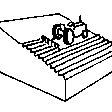
农艺措施
- A1:植被和土壤覆盖层
- A2:有机质/土壤肥力
- A3:土壤表面处理
3.7 该技术强调的主要土地退化类型
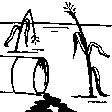
化学性土壤退化
- Cn:肥力下降和有机质含量下降(非侵蚀所致)
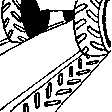
物理性土壤退化
- Pc:压实
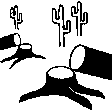
生物性退化
- Bq:数量/生物量减少
- Bs:质量和物种组成/多样性的下降
3.8 防止、减少或恢复土地退化
具体数量名该技术与土地退化有关的目标:
- 防止土地退化
- 减少土地退化
4. 技术规范、实施活动、投入和成本
4.1 该技术的技术图纸
技术规范(与技术图纸相关):
Species used: Phacelia tanacetifolia
Family: Hydrophyllaceae
Common name: Lacy Phacelia, Wildlife, Set-aside, Cover Crop or Green Manure
Origin: North America
Height of plant: 60-90cm
Spacing between plants: 25cm
Sowing period: September-October
Growing period: Winter
Flowering period: February-March
Flower: Lavender-Mauve-Blue
Other specifications: Perfect honey-producing flowers
作者:
Alicia Morugán Coronado
日期:
18/10/2017
4.2 有关投入和成本计算的一般信息
具体说明成本和投入是如何计算的:
- 每个技术区域
注明尺寸和面积单位:
0.2 ha
如果使用本地面积单位,注明转换系数为1公顷(例如1公顷=2.47英亩):1公顷=:
2 acres
其它/国家货币(具体说明):
euro
如相关,注明美元与当地货币的汇率(例如1美元=79.9巴西雷亚尔):1美元=:
0.85
注明雇用劳工的每日平均工资成本:
10€/hour
4.4 技术建立所需要的费用和投入
| 对投入进行具体说明 | 单位 | 数量 | 单位成本 | 每项投入的总成本 | 土地使用者承担的成本% | |
|---|---|---|---|---|---|---|
| 设备 | tractor | piece | 1.0 | 3300.0 | 3300.0 | 100.0 |
| 设备 | manual sowing machine | piece | 1.0 | 200.0 | 200.0 | 100.0 |
| 设备 | drop irrigation pipe | piece | 4.0 | 18.0 | 72.0 | 100.0 |
| 设备 | weed whacker | piece | 1.0 | 14.0 | 14.0 | 100.0 |
| 设备 | draw hoe | piece | 1.0 | 30.0 | 30.0 | 100.0 |
| 技术建立所需总成本 | 3616.0 | |||||
| 技术建立总成本,美元 | 4254.12 | |||||
4.5 维护/经常性活动
| 活动 | 时间/频率 | |
|---|---|---|
| 1. | Tillage | before plant green manure |
| 2. | Planting | September - October |
| 3. | Irrigation | after planting the green manure |
| 4. | remove weeds | during the whole process |
| 5. | cut the Phacelia | before seed formation (march) |
| 6. | mix the green manure with soil | march |
4.6 维护/经常性活动所需要的费用和投入(每年)
| 对投入进行具体说明 | 单位 | 数量 | 单位成本 | 每项投入的总成本 | 土地使用者承担的成本% | |
|---|---|---|---|---|---|---|
| 劳动力 | planting | person-hour | 6.0 | 10.0 | 60.0 | 100.0 |
| 劳动力 | remove weeds | person-hour | 24.0 | 10.0 | 240.0 | 100.0 |
| 劳动力 | cutting plants | person-hour | 8.0 | 10.0 | 80.0 | 100.0 |
| 劳动力 | tillage and mix the plants into soil | person-hour | 8.0 | 10.0 | 80.0 | 100.0 |
| 植物材料 | seed of Phacelia tanacetifolia | bag | 20.0 | 13.0 | 260.0 | 100.0 |
| 其它 | Drop irrigation installation | person-hour | 6.0 | 10.0 | 60.0 | 100.0 |
| 技术维护所需总成本 | 780.0 | |||||
| 技术维护总成本,美元 | 917.65 | |||||
注释:
The cost for the equipment to execute the recurent activities are listed under the establishment costs.
All the work is carried out by the land user and her family.
Each bag of Phacelia contains 100 gr approximately.
4.7 影响成本的最重要因素
描述影响成本的最决定性因素:
The cost to establish and maintain this technology is relatively high but it is compensated with the monetary gains of her other productive orchard land.
5. 自然和人文环境
5.1 气候
年降雨量
- < 250毫米
- 251-500毫米
- 501-750毫米
- 751-1,000毫米
- 1,001-1,500毫米
- 1,501-2,000毫米
- 2,001-3,000毫米
- 3,001-4,000毫米
- > 4,000毫米
指定年平均降雨量(若已知),单位为mm:
365.00
有关降雨的规范/注释:
rainfall in autumn (october-november)
农业气候带
- 半干旱
18ºC of average
https://www.meteoclimatic.net/perfil/ESPVA0300000003110C
5.2 地形
平均坡度:
- 水平(0-2%)
- 缓降(3-5%)
- 平缓(6-10%)
- 滚坡(11-15%)
- 崎岖(16-30%)
- 陡峭(31-60%)
- 非常陡峭(>60%)
地形:
- 高原/平原
- 山脊
- 山坡
- 山地斜坡
- 麓坡
- 谷底
垂直分布带:
- 0-100 m a.s.l.
- 101-500 m a.s.l.
- 501-1,000 m a.s.l.
- 1,001-1,500 m a.s.l.
- 1,501-2,000 m a.s.l.
- 2,001-2,500 m a.s.l.
- 2,501-3,000 m a.s.l.
- 3,001-4,000 m a.s.l.
- > 4,000 m a.s.l.
说明该技术是否专门应用于:
- 不相关
关于地形的注释和进一步规范:
the orchard is flat and 77 m.a.l.s.
5.3 土壤
平均土层深度:
- 非常浅(0-20厘米)
- 浅(21-50厘米)
- 中等深度(51-80厘米)
- 深(81-120厘米)
- 非常深(> 120厘米)
土壤质地(表土):
- 中粒(壤土、粉土)
土壤质地(地表以下> 20厘米):
- 中粒(壤土、粉土)
表土有机质:
- 高(>3%)
如有可能,附上完整的土壤描述或具体说明可用的信息,例如土壤类型、土壤酸碱度、阳离子交换能力、氮、盐度等。:
pH 8.1; N: 2.7 g/kg, electrical conductivity 2630 µS/cm, available P 7.3%
5.4 水资源可用性和质量
地下水位表:
表面上
地表水的可用性:
好
水质(未处理):
仅供农业使用(灌溉)
水的盐度有问题吗?:
是
具体说明:
high salt content
该区域正在发生洪水吗?:
否
5.5 生物多样性
物种多样性:
- 中等
栖息地多样性:
- 低
5.6 应用该技术的土地使用者的特征
定栖或游牧:
- 定栖的
生产系统的市场定位:
- 混合(生计/商业)
非农收入:
- > 收入的50%
相对财富水平:
- 平均水平
个人或集体:
- 个人/家庭
机械化水平:
- 手工作业
性别:
- 女人
土地使用者的年龄:
- 中年人
5.7 应用该技术的土地使用者使用的平均土地面积
- < 0.5 公顷
- 0.5-1 公顷
- 1-2 公顷
- 2-5公顷
- 5-15公顷
- 15-50公顷
- 50-100公顷
- 100-500公顷
- 500-1,000公顷
- 1,000-10,000公顷
- > 10,000公顷
这被认为是小规模、中规模还是大规模的(参照当地实际情况)?:
- 小规模的
注释:
The size of the whole orchard is approximately 1-2ha, only in less of a 0.5ha the technology was applied every year.
5.8 土地所有权、土地使用权和水使用权
土地所有权:
- 个人,未命名
土地使用权:
- 租赁
用水权:
- 租赁
5.9 进入服务和基础设施的通道
健康:
- 贫瘠
- 适度的
- 好
教育:
- 贫瘠
- 适度的
- 好
技术援助:
- 贫瘠
- 适度的
- 好
就业(例如非农):
- 贫瘠
- 适度的
- 好
市场:
- 贫瘠
- 适度的
- 好
能源:
- 贫瘠
- 适度的
- 好
道路和交通:
- 贫瘠
- 适度的
- 好
饮用水和卫生设施:
- 贫瘠
- 适度的
- 好
金融服务:
- 贫瘠
- 适度的
- 好
6. 影响和结论性说明
6.1 该技术的现场影响
社会经济效应
收入和成本
农业投入费用
注释/具体说明:
High short term costs but low medium and long term costs expected
工作量
注释/具体说明:
After green manure application less workload in medium and long term is expected.
生态影响
土壤
土壤水分
注释/具体说明:
Increasing water holding capacity of the soil is observed after green manure application.
土壤覆盖层
注释/具体说明:
Covering the soil with Phacelia the soil surface is covered also after harvest of the main crops.
土壤压实
注释/具体说明:
Less soil compaction due to better soil structure and due to the green manure application.
养分循环/补给
注释/具体说明:
After first anual green manure in the soil the land user observed an enhancement of nutrient content in the soil.
土壤有机物/地下C
注释/具体说明:
Applying a green manure every year the land user detected an increase in soil organic matter on soil.
生物多样性:植被、动物
动物多样性
注释/具体说明:
With Phacelia the colony of honey bees and ohter insect species has been increased during the flowering period.
有益物种
注释/具体说明:
Honey bees are attracted to flowers for the pollen of Phacelia before cut the plant in seeding process formation.
6.2 该技术的场外影响已经显现
对邻近农田的破坏
注释/具体说明:
No pollution by herbicides/pesticides.
温室气体的影响
注释/具体说明:
Green manure or vegetation cover reduced greenhouse gas emissions.
6.3 技术对渐变气候以及与气候相关的极端情况/灾害的暴露和敏感性(土地使用者认为的极端情况/灾害)
渐变气候
渐变气候
| 季节 | 增加或减少 | 该技术是如何应对的? | |
|---|---|---|---|
| 季雨量 | 秋季 | 增加 | 适度 |
气候有关的极端情况(灾害)
气候灾害
| 该技术是如何应对的? | |
|---|---|
| 干旱 | 适度 |
水文灾害
| 该技术是如何应对的? | |
|---|---|
| 山洪暴发 | 适度 |
生物灾害
| 该技术是如何应对的? | |
|---|---|
| 昆虫/蠕虫侵扰 | 非常好 |
6.4 成本效益分析
技术收益与技术建立成本相比如何(从土地使用者的角度看)?
短期回报:
中性/平衡
长期回报:
非常积极
技术收益与技术维护成本/经常性成本相比如何(从土地使用者的角度看)?
短期回报:
轻度消极
长期回报:
非常积极
注释:
The land user had problems to cope with the money input to establish the SLM technology at the beginning of the process, but in long-term it will be better.
6.5 技术采用
- 单例/实验
在所有采用这项技术的人当中,有多少人是自发的,即未获得任何物质奖励/付款?:
- 91-100%
注释:
The land user did not receive any funding to establish the technology.
6.6 适应
最近是否对该技术进行了修改以适应不断变化的条件?:
否
6.7 该技术的优点/长处/机会
| 土地使用者眼中的长处/优势/机会 |
|---|
| Enhacement of soil organic matter |
| Increase in honey bees colony during the flowering time, before plant cutting in seed formation period. |
| 编制者或其他关键资源人员认为的长处/优势/机会 |
|---|
| Reduction of soil degradation |
| Imporve the soil structure |
6.8 技术的弱点/缺点/风险及其克服方法
| 土地使用者认为的弱点/缺点/风险 | 如何克服它们? |
|---|---|
| The high dependency on climatological conditions | Pay special attention on soil structure |
| The lack of funding to establish the technology | The land user must to pay all the material with the income of other crop production |
| 编制者或其他关键资源人员认为的弱点/缺点/风险 | 如何克服它们? |
|---|---|
| The big amount money for this technology during a year without any crop production to sale. | The land user needs another productivity orchard during this period to cope with the green manure expenses. |
7. 参考和链接
7.1 信息的方法/来源
- 实地考察、实地调查
3 field visits
- 与土地使用者的访谈
2
(现场)数据是什么时候汇编的?:
17/10/2017
7.2 参考可用出版物
标题、作者、年份、ISBN:
no
7.3 链接到网络上的相关信息
标题/说明:
Web page of the organic farm
URL:
https://verduresecologiques.com/
标题/说明:
Biodynamic farming information
URL:
https://warmonderhof.nl/
链接和模块
全部展开 全部收起链接
无链接
模块
无模块


